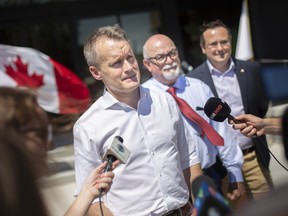
Labor Minister Seamus O’Regan is the latest federal cabinet minister to be invited to Sarnia to ensure the community, and its workers, aren’t forgotten in Canada’s pursuit of net-zero carbon emissions and clean-energy jobs.
Sarnia Mayor Mike Bradley said he’s waiting for a reply to an invitation he sent recently to O’Regan, much like one that led to Natural Resources Minister Jonathan Wilkinson visiting the community in January to hear about what’s being done locally to move to net-zero emissions.
The invitations follow the federal government’s moves to enact a sustainable jobs plan to help workers in the oil and gas sectors move to clean-energy jobs as Canada and other nations aim for net-zero emissions by 2050.
The plan, released in February and to be followed by legislation later this year, includes steps such as setting up a sustainable jobs secretariat to co-ordinate government policies and a partnership council to promote consultation with provinces, labor unions and others.
Canada said it is also planning to improve labor market data collection and advance funding for skills development, although the document did not outline any new government spending. From 2025, the government plans to release a new sustainable jobs plan every five years.
Bradley said it’s important cabinet ministers “see what we’re doing as it relates to climate change, the research park, bio-innovation centre, Lambton College,” to avoid having the government’s focus on Western Canada alone.
“If we’re not beating our own drum in Ottawa and Queen’s Park, no one else is going to do it,” he said.
Along with the invitations to cabinet ministers, the Sarnia-Lambton Economic Partnership – a county-funded agency responsible for economic development – is working to raise the government’s awareness of the community’s role.
Bradley said he spoke several times with O’Regan in the federal politician’s previous role as natural resources minister. At that time, local community leaders were working to get Ottawa’s attention about efforts by Michigan state officials to shut down the Enbridge Line 5 oil and natural gas liquids pipeline that helps to feed industries in Sarnia and Eastern Canada.
That issue is still before the courts in Michigan.
Line 5 is one of many oil and natural gas liquids pipelines converging on the Sarnia area which is home to three refineries and several chemical manufacturers.
Bradley said he’s hopeful O’Regan will accept the invitation.
Bradley said Wilkinson’s recent visit was a success but the first time they spoke the minister’s comments were about what Alberta was doing to develop hydrogen and that province’s other climate change initiatives.
“I said, ‘Well, we’re doing all those things too,’” Bradley said.
During Wilkinson’s visit to Sarnia, he heard from community, labor and local industry representatives while touring the Western Sarnia-Lambton Research Park.
“The followup is to bring in O’Regan” to speak with local labor and business representatives about the coming legislation, Bradley said.
“I think it’s really good opportunity, also, to showcase the excellent relationship between industry, business and labor here, and how they can’t be left behind on this sustainability direction,” he said.
Partners in the community are already working “to get to net-zero” and federal officials “need to know that,” Bradley said.
“We’re flagging very clearly, ‘We can be of help to you, getting your goals completed,’ and at the same time there’s a benefit to us if we can protect jobs,” he said.
Bradley said that along with being part of the move to net-zero emissions, the community needs to protect itself as Ottawa moves ahead with its sustainable jobs plan.
“You can either resist the change or you can try and figure out, ‘How can we make this work?’”
Along with those employed directly by refineries and chemical plants, the community has thousands of residents with jobs in construction trades, at fabrication shops and in other services relying on work created by the local petrochemical industries.
“I’ve seen Ottawa and Queen’s Park, many times, bring in legislation and then you see after the fact they weren’t consulting, or they didn’t get it right,” Bradley said.
With files from Reuters

Comments
Postmedia is committed to maintaining a lively but civil forum for discussion and encourages all readers to share their views on our articles. Comments may take up to an hour for moderation before appearing on the site. We ask you to keep your comments relevant and respectful. We have enabled email notifications—you will now receive an email if you receive a reply to your comment, there is an update to a comment thread you follow or if a user you follow comments. Visit our Community Guidelines for more information and details on how to adjust your email settings.
Join the Conversation